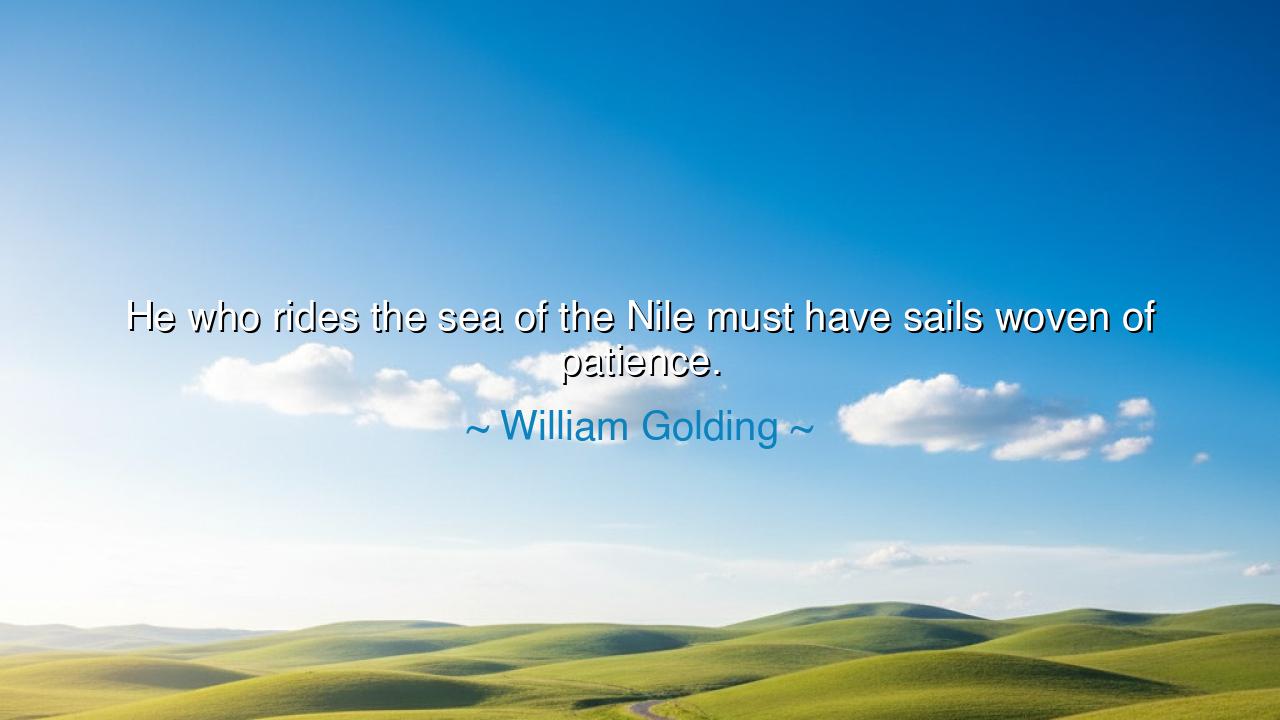
He who rides the sea of the Nile must have sails woven of






The words of William Golding—“He who rides the sea of the Nile must have sails woven of patience”—flow like the river itself, deep, timeless, and filled with hidden power. To journey upon the Nile, lifeblood of ancient Egypt, was to submit oneself to its rhythms, its floods, its shifting currents, its mysterious moods. Golding speaks in metaphor, teaching that any great endeavor, like sailing upon this mighty river, demands not haste but patience. For the Nile could not be commanded; it had to be respected. So too life itself cannot be forced into our will, but requires sails carefully stitched with endurance and trust in time.
The origin of this wisdom can be traced to the very history of Egypt, a civilization that rose and thrived by the grace of the Nile. Each year, its floods came, not on command, but in their own season. The people had no choice but to wait, to plan, to endure, knowing that the river’s patience was the condition for their survival. A farmer who demanded instant harvest would starve, but the one who sowed, waited, and trusted the flood would reap abundance. Golding, through this ancient imagery, reminds us that progress, growth, and triumph are bound to the same law: patience is the sail without which no vessel can move forward.
Consider the story of Moses, who as a child was set afloat upon this very Nile. His life was not rushed, nor his destiny fulfilled in a single day. He wandered years in the wilderness, endured rejection, wrestled with fear, and waited decades before he became the liberator of his people. His sails were indeed woven of patience, and without such endurance, his mission would have collapsed beneath the weight of despair. The Nile that bore him as an infant became a symbol of the patient river of destiny itself.
In more recent memory, think of Nelson Mandela, who endured twenty-seven years in prison before leading South Africa into freedom. The impatient would have despaired in the chains of Robben Island. But Mandela’s patience became his greatest strength. He wove his sails from endurance, from hope unbroken, and when at last the winds of history filled them, he steered his people toward freedom. His story is a modern echo of Golding’s truth: the greater the river one must cross, the stronger the sails of patience must be.
Golding’s words are also a rebuke to the restless spirit of our age, which demands instant results, instant victories, instant gratification. Such impatience is like setting forth upon the Nile with torn sails—it ensures only ruin. The mighty currents of life do not yield to shouting or haste; they answer only to those who wait, endure, and navigate with care. The river teaches humility: man is not its master but its student. And so it is with all trials—whether in work, in love, in dreams, or in faith.
The lesson for us is clear: if you wish to cross the rivers of difficulty, to endure the floods of hardship, or to reach the far shores of your destiny, you must weave sails out of patience. Impatience will tear, and your vessel will drift aimlessly. But patience will catch the winds of opportunity when they come, and carry you forward safely. This is not weakness—it is the greatest strength, for only those who endure can reach what lies beyond the horizon.
In practice, this means cultivating patience in all things: in the pursuit of your goals, in your trials, in your relationships, and in your failures. When progress is slow, remind yourself that rivers do not rush, but still they carve valleys. When life seems still, remember that waiting is not emptiness, but preparation. Let your sails be stitched with endurance, and your heart with faith. For patience, once woven into the very fabric of your being, will carry you across even the widest and most turbulent of rivers.
So let Golding’s words echo like a hymn upon the waters: “He who rides the sea of the Nile must have sails woven of patience.” May we be sailors of this river of life, guided not by haste but by endurance, moving not by force but by trust. For those who learn to wait upon the currents shall, in time, find themselves borne onward to the lands of promise and peace.






AAdministratorAdministrator
Welcome, honored guests. Please leave a comment, we will respond soon